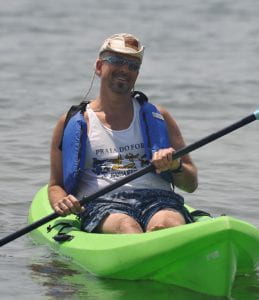Office: Smith 257 Laboratory: SC 3109
Email: jnelson@towson.edu
Phone: 443-465-5019
Research Philosophy:
-Broadly stated, my research interests are to understand how the environment controls life processes in fish and how fish can respond to environmental changes, especially those enacted by human activities. Climate change and other anthropogenic factors are altering fish habitat across the globe. These include, but are not limited to, the warming of waters, ocean acidification, expansion of hypoxic and anoxic dead zones, changing freshwater hydrology and altered ocean currents. How fish respond physiologically and behaviorally to these changes will determine which fishes survive the opening of the newest geological age, the Anthropocene. My work in this area started as an undergraduate at the University of Washington when I published my undergraduate research on the effects of acid rain on developing fish. My Ph. D. work at the University of Wisconsin-Madison focused on how fish from naturally acidic lakes thrived there; work still relevant today as concerns over global ocean acidification grow. My post-doctoral work in Germany on carp and Caribbean blue crabs concentrated on how animals respond to high carbon dioxide in the water. For my second post-doc in Nova Scotia, Canada, I studied how Atlantic cod adjust to different environments. There I used fish exercise and metabolic performance as indicators of how well fish can potentially do in an environment, but I also further developed my remaining lifetime foci on the importance of intraspecific individual differences in physiology and on establishing the repeatability of physiological measurements made on fish from natural environments.
– My current research is following several separate paths to continue to understand how fish fare in altered environments, and a new one examining the physiological tolerances of an invasive fish species to predict their expansion potential. One direction looks at hypoxia tolerance in juvenile striped bass, European sea bass and white perch, all members of the fish family Moronidae and all economically important, and how these fish species function in the hypoxic zones that they increasingly encounter in human-impacted environments. As humans continue to urbanize and expand, hypoxic estuarine zones will only increase and natural selection may favor those animals that perform better in hypoxia.
-I am also very interested in how future changes in flow and temperature brought about by climate change will influence fish populations in streams and rivers. I am currently examining this by using urbanization as a harbinger of climate change. Many of changes predicted for climate change have already happened in urban streams and studying the fishes from urban streams may help us forecast the future of fish. I have also used a similar approach to start a research program on Arctic charr in Iceland that inhabit waters naturally warmed by geothermal activity.
– I have an active research program that involves students and is international in both its scope and recognition. I have supervised over 55 undergraduate research students and 20 Master’s students (see linked pages), conducted research in 6 different countries and collaborated with scientists of 15 different nationalities.
Undergraduates supervised & selected outcomes:
Graduate students supervised & selected outcomes:
Teaching Philosophy:
My main goal as an instructor is to try and get students to understand how living systems work as opposed to just learning about them. Students often find this challenging, but I believe that they will be better off for it in the long run as understanding is easily recalled and built upon whereas memorization is ephemeral. I fervently incorporate new research into my teaching so that students leave my classes with as contemporary a knowledge of physiology and aquatic biology as possible.
-The courses I teach are as follows (sample syllabi available by clicking the link):
Undergraduate courses: Human Anatomy and Physiology I (Biol. 221)
Human Anatomy and Physiology II (Biol. 222)
Animal Physiology (BIOL 325): course schedule
Humans Science & the Chesapeake Bay (Biol. 333)
Advanced Physiology (Biol 470)
Advanced Physiology Lab (Biol 471)
Graduate courses:
Mechanisms of Animal Physiology (BIOL. 604)
Evolutionary and Ecological Physiology (Biol. 607)
Human Interactions with the Marine Environment
